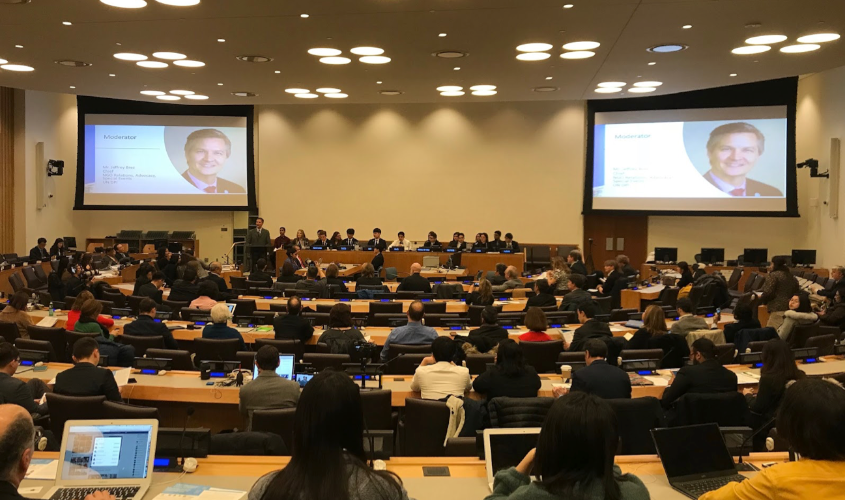Achieving the Sustainable Development Goals through STEAM and Global Citizenship Education

Photo © Jake Cho/GBC-Education
On Monday, February 5, IVECA International Virtual Schooling and Samsung Electronics America hosted the “STEAM Education for Global Citizenship to Achieve the SDGs event” at the United Nations Headquarters in New York. As part of the Global Classroom STEAM Challenge (GCSC), students from five countries showcased their 10-week collaborative project.
The student teams were tasked to use STEAM (science, technology, engineering, arts, and math) skills to find solutions to problems in their local communities that align with the UN Sustainable Development Goals (SDGs). The use of IVECA virtual classroom platform facilitated the communication and collaboration between student teams to brainstorm, share research, and provide feedback to their international counterparts.
The solutions presented by student teams include:
- Website and NGO to collect and distribute food – “No Poverty” and “Zero Hunger” SDGs
- Air cooling and groundwater recycling devices from reusable materials – “Clean Energy” and “Climate Action” and “Life and Land” SDGs
- Education programs to create jobs and improve local economy through tourism and equal employment – “Decent work and Economic Growth” and “Industry, Innovation, and Infrastructure” SDGs
- Website and mobile app to reduce and better manage litter – “Good Health and Well Being” SDG
The student presentations were a testament to the power of innovative public-private partnerships in Global Citizenship Education that combined quality STEAM education and the use of technology to cultivate global citizenship through a hands-on international project-based collaboration.
“Global Citizenship Education starts from identity and connection with community,” said Eunee Jung, the Founder of IVECA. “Only then, can we lead our youth to develop empathy and compassion, intercultural competence to live and work with people from diverse cultural backgrounds, and the capacity to collectively tackle local and global challenges that we face.”
Ann Woo, Senior Director of Corporate Citizenship at Samsung Electronics of America, echoed Eunee’s point by stating that “the goal was to really challenge these students with the how –– how can they be innovative in their thinking and use STEAM skills to overcome sustainable development challenges in their communities by giving these students from around the world the opportunity to interact with their peers on issues that transcend their local communities”
H.E. Ambassador Park Chull-joo, Deputy Permanent Representative of the Republic of Korea to the UN. touted the students’ presentation as impressive and concrete examples of global citizenship education. Ambassador Park further noted that “global citizenship education is the best tool to equip the next generation to tackle many of our most pressing problems, including violent extremism, inequality, poverty, and climate change, through fundamental values of humanity.”
Promoting trust and tolerance is key to sustainable development. By teaching the youth to coexist and co-create, we can equip them with the capacity to work across divisive political and economic spectrums and find solutions that can help tackle even the most divisive and disruptive global issues. As last week’s event demonstrated, innovative public-private partnerships can become a catalyst for providing quality education to our youth that inculcates the civic awareness, empathy, and skills to become a true global citizen.
Education for Global Citizenship (EGC) is a crucial aspect of the ongoing efforts to meet the UN Sustainable Development Goal 4, particularly target 4.7 that seeks to ensure that “by 2030, all learners acquire the knowledge and skills needed to promote sustainable development, including, among others, through education for sustainable development and sustainable lifestyles, human rights, gender equality, promotion of a culture of peace and non-violence, global citizenship, and appreciation of cultural diversity and of culture’s contribution to sustainable development.”
